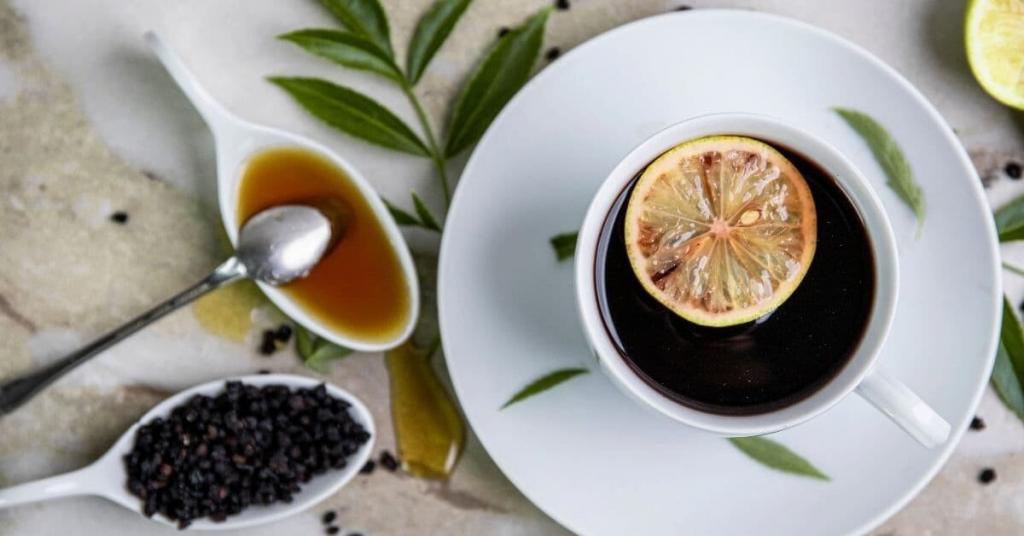Elderberry tea is a delicious and healthy beverage that you can make at home with a few simple ingredients. Elderberries are rich in vitamin C, antioxidants, and other nutrients which support your immune system making this a great choice for cold and flu season!

This post may contain affiliate links, which means I’ll receive a commission if you purchase through my links, at no extra cost to you. Please read full disclosure for more information.
Health Benefits Of Elderberries
Elderberries (Sambucus nigra) are a common natural remedy with a long history of use for the prevention and treatment of cold and flu-like symptoms.
If you are interested in trying this popular dietary supplement, you can choose to brew the berries into an herbal tea, make your own homemade elderberry syrup, or purchase an already made product.
The reason this herbal medicine is so popular is that it contains an assortment of beneficial properties such as anthocyanin, tannin, catechin, and ellagic acid.

The dark-purple berries also contain significant levels of flavonoids and plant sterols that may play a role in preventing heart disease.
Elderberries are also a great source of dietary fiber which further supports your digestive system.
If you decide to try this folk medicine, consider this: some of the health benefits of elderberry tea are its ability to boost the immune system, reduce inflammation and help you fight off colds and flu, help with a sore throat, reduce free radicals, and oxidative stress.
Elderberries have been shown to provide relief from symptoms such as:
- headaches
- sore throats
- cold and flu symptoms
- fevers
- allergy symptoms
- upset stomachs or diarrhea
These helpful little berries from the elderberry plant also contain antioxidants that may help protect your cells from free radical damage and healthy components which can assist with heart health.
And a hot cup of immune-boosting elderberry tea is a great way to warm up in the cooler months and support your body at the same time!
Possible Side Effects Associated With Elderberries
Cooked or dried berries are generally non-toxic and considered safe to eat. (It is not considered safe to eat uncooked or unripe berries)
However, those who have a history of allergy or sensitivities to elderberry may experience certain side effects such as:
- diarrhea
- nausea
- vomiting
- dizziness
- increased urination
- muscle fatigue
If you are pregnant, nursing, or taking prescription medications, be sure to consult your doctor or seek medical advice before consuming any form of elderberry.
Easy Elderberry Tea Recipe
Elderberry tea is the simplest way to ingest these health-promoting compounds, but you can also use them in a number of other ways including syrup, pies, kombucha, and even elderberry cocktails.

Ready for that super easy recipe? Here it is!
Ingredients:
2 Tbsp of dried elderberries (you can use fresh berries if you prefer)
2 cups hot water
Optional Ingredients:
-Cinnamon (whole stick or ground will work)
-Raw honey or maple syrup for added sweetness (optional)
-Vanilla
-Lemon
-Cloves
-Fresh ginger
-Other immune-boosting herbs such as Echinacea or Astragalus
Directions
- Add the water, elderberries, and any additional ingredients needed to a small pan
- Bring it to a boil, then reduce the heat and simmer for about 15 minutes
- After simmering, pour the mixture through a fine-mesh strainer or cheesecloth to remove the elderberries and any other ingredients
- Serve warm with any delicious additions you would like. (Lemon, honey, and ground cinnamon can be added after boiling. Other herbs, a cinnamon stick, cloves, or fresh ginger work better when boiled with the elderberries)
- Enjoy!
Any leftover tea can be stored in the fridge for up to a week.
If you would like to make larger batches, then consider freezing the tea for longer storage.
FAQ’s About Elderberry Tea
Still have a few questions about elderberries or the tea? No problem! I’ll do my best to answer some of the common questions here.
1. Where do you find elderberries?
You can harvest your own fresh elderberries if you have a tree (or if you know someone else that does), or you can buy dried berries. I prefer the dried elderberries because they last for quite a long time, are a little less messy, and are easy to use.
2. Can you use boil the berries twice?
You definitely could. The tea may not be as strong the second time, but it would still be delicious and offer the same benefits, just a little weaker.
3. Can you drink elderberry tea every day?
Elderberry tea is generally considered safe to drink in moderation every day. But do make sure that you are taking a break on occasion. Even though elderberry is considered an immunomodulator and a tonic, it is also considered to be an immune stimulant and can be too much for some people, especially if you have an autoimmune disease.
4. Does this tea contain caffeine?
No, elderberry tea does not contain caffeine.
5. What does elderberry tea taste like?
Plain black elderberry tea has kind of a sweet but tart flavor (especially if you don’t add a sweetener). But, the taste of your tea will depend greatly on what you decide to add.
6. Are elderberries poisonous?
Elderberries are not poisonous, but raw berries should be avoided. Raw berries can cause stomach trouble such as nausea and diarrhea. And the seeds, leaves, stems, and roots should be avoided since those ARE considered poisonous to humans and can cause a build-up of cyanide in the body.
7. Do elderberries cause cytokine storms?
There has been a lot of speculation and plenty of misinformation about elderberry and cytokine storms, especially recently. And here’s why… cytokines send messages between cells in order for systemic responses like inflammation or immune reactions to take place when necessary, and elderberry extract contains chemicals that act as “cytokinesetic” agents (stimulates cell growth), so some people have speculated that using elderberries could cause possible cytokine storms, but zero cases of this happening have been reported. In fact, in two different studies elderberry was shown to have a balancing and inflammation-modulating effect.
Last Thoughts About Elderberry Tea
Elderberry tea is a delicious and healthy beverage that you can make at home with just 2 or 3 ingredients.
If you’ve never tried it before, you may be surprised by how easy it is to whip up a batch on your stovetop in less than 10 minutes!
In addition to being a delicious tea for cold and flu season, elderberries are also rich in vitamin C as well as antioxidants which help support your immune system.
Have any of you ever tried making elderberry tea? What were your results? Let me know in the comments below, I’d love to hear your experience!
Printable Elderberry Tea Recipe

Elderberry Tea
Elderberry tea is a delicious and healthy beverage that you can make at home with a few simple ingredients. Elderberries are rich in vitamin C, antioxidants, and other nutrients which support your immune system making this a great choice for cold and flu season!
Ingredients
- 2 Tbsp of dried elderberries
- 2 cups hot water
Instructions
- Add the water, elderberries, and any additional ingredients needed to a small pan
- Bring it to a boil, then reduce the heat and simmer for about 15 minutes
- After simmering, pour the mixture through a fine-mesh strainer or cheesecloth to remove the elderberries and any other ingredients
- Serve warm with any delicious additions you would like. (Lemon, honey, and ground cinnamon can be added after boiling. Other herbs, a cinnamon stick, cloves, or fresh ginger work better when boiled with the elderberries)
- Enjoy!
Notes
Optional Ingredients:
-Cinnamon (whole stick or ground will work)
-Raw honey or maple syrup for added sweetness (optional)
-Vanilla
-Lemon
-Cloves
-Fresh ginger
-Other immune-boosting herbs such as Echinacea or Astragalus
Any leftover tea can be stored in the fridge for up to a week.
If you would like to make larger batches, then consider freezing the tea for longer storage.
Related Articles
- Elderberry Syrup For Flu Prevention And Recover
- Elderflower Tea: An Easy Recipe + Healing Benefits
- Herbal Tea Bombs: A Natural Remedy for Cold and Flu Symptoms
- 5 Herbs To Support A Healthy Immune System
- 10 Tips For A Naturally Healthy Cold And Flu Season
- How To Make Pine Needle Tea (+Health Benefits And Easy Recipe!)
- Honey Lemon & Ginger Tea (Health Benefits & Easy Recipe)


